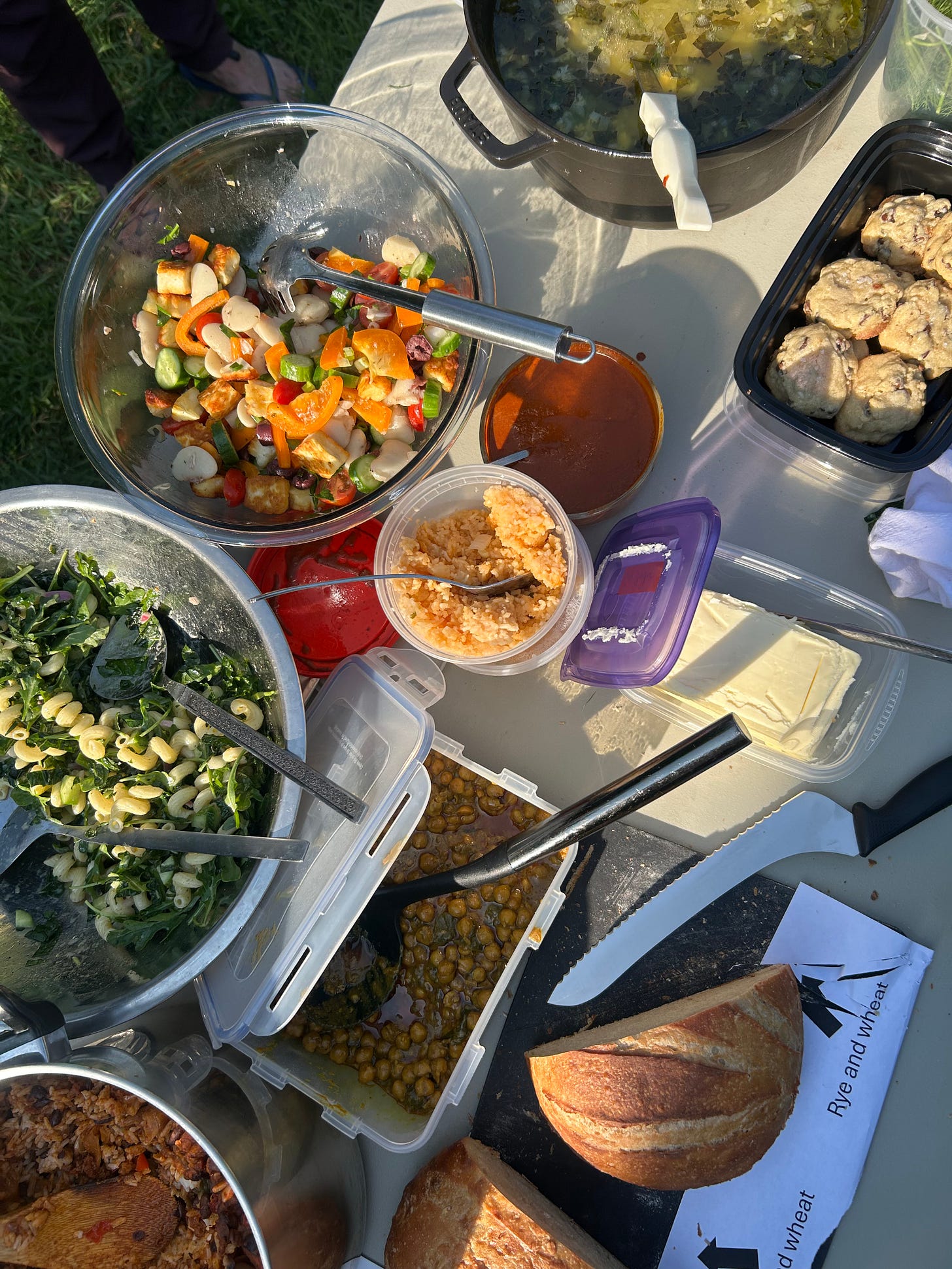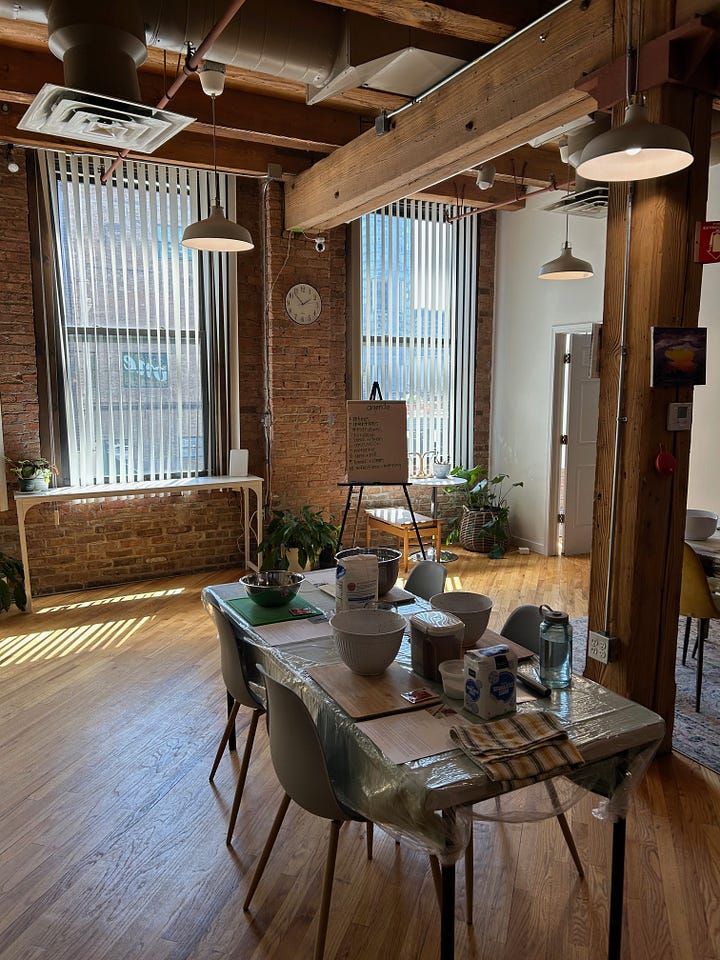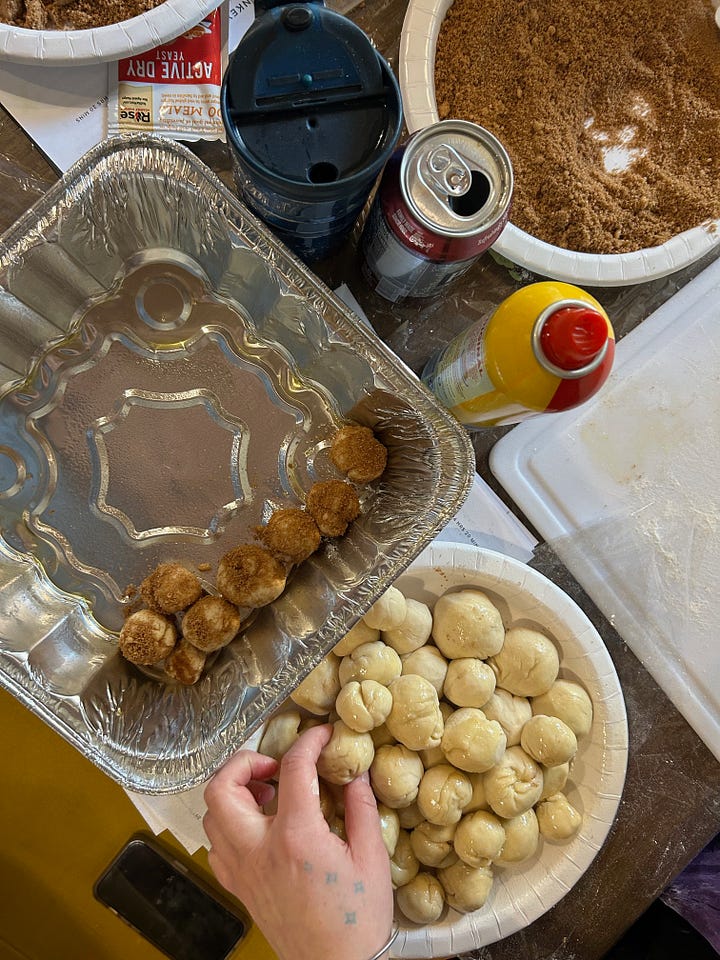Spring: Ideas in Bloom
Emerging updates
Another spring newsletter of change! I love this crowded table of my world, but being in new and crowded spaces feels less possible. While the loneliness of our dominant culture expands, our capacities to do something with it diminishes. What is left is a strong stream of dread, burnout, overwhelm, guilt, and grief that gets in the way of our existing connections and ability to show up in places that can tend to our hurt. This often leads to isolation with compounding despair and helplessness. I feel my own loneliness as a flag for longing that guides me towards my relational needs. This takes consistent monitoring and curiosity to move with and through discomfort. Systems of oppression sustain and thrive around us and that effort isn’t always possible—even when we long for it. This article, America the Lonely: social isolation, public health, and right-wing populism, says more on this than I ever could.
My concern is that A Crowded Table is asking for effort from those who have little to spare rather than supporting existing streams of connection and care. This winter, I wrote about survival and grief and while the ground has thawed and the daylight stretched, we are not safe. I want to offer something, rather than asking for more. This means releasing workshops and embracing gatherings—something I am already practicing. To do this, I am seeking existing tables that want a collective experience. Think team building, family dinner, potluck with friends, community gatherings, virtual event, skill share, oh my! If you have resonated with these ideas and practice, I invite you to identify a space where you and your people may benefit. Then let me know! If you have not found your crowded table, I want to partner with you to interrupt the cycle of longing and despair to support your efforts in connection.
Some logistics—I have a menu of experiences with varying intentions from learning mindfulness, trying a new cooking skill or recipe, practicing presence, building connection, and having fun! Cost is flexible and my intention is to share this knowledge with those who want it. Complete this interest form or send me an email with an idea.

In offering gatherings and relational support to combat an Epidemic of Loneliness, it is important to remember that loneliness is a product of white supremacy culture—not an individual failing. We all steep in individualism, perfectionism, and a right to comfort without the skills to interrupt the harm of isolation and disconnection. Even with knowledge and ability, moving against the current of white supremacy is often difficult and painful and cannot be done alone. The tenets of white supremacy culture were developed by Kenneth Jones and Tema Okun in 2001 and compiled into a free digital resource, Dismantling Racism: A Workbook for Social Change Groups. This is a crucial text for how white supremacy impacts all of our relationships, impairing our ability to safely connect.
I have seen and continue to believe that relationships, when practiced safely, will heal us, each other, and the world. People of color and queer people have practiced reciprocal relationships out of necessity for survival as they are more impacted and vulnerable to the harms of white supremacy and capitalism. How can you engage with this text and practice with purpose?
My most recent event with Chicago Minds was an example of this meaningful shift towards gathering. Their Community Organizer, Sarah Hormanski, asked for a facilitator to offer an experience to their members and the larger community of therapists. Although there were strangers in the room, many had shared connections and experiences that grounded us in safety. It was a beautiful afternoon—light beams, exposed beams, and beaming faces connecting and creating. I left feeling as full as the pans of risen dough. Check out some pictures below!




During this event, I offered an updated intention check in for participants. Since folks join these events with different expectations and needs, it was an invitation to gain clarity on what they were hoping to see. This helps me tailor the experience and empowers participants to engage in ways that works for them.
I say intention so much it is losing meaning for me. I try to fight against the tides of wellness culture that divorces and coopts meaning from historically helpful therapy concepts. Popular examples include—trauma, triggered, self care, even community. I hope in spending time with language we can tether ourselves to meaning so let’s see how that goes with intention:
When we bring an intention, or a why, we can better shape that experience to meet our expectations and needs OR have more understanding as to why it did not work the way we hoped. Clarifying your intention can help you move through uncertainty, shame, and anger.
Ask yourself: when I leave this interaction what do I hope to feel? Is there a need that this interaction might be able to meet? Maybe you already have clear answers, thats great! Use them! Many of us will not so try on a few options:
Presence—are you looking to feel grounded and aware of yourself in this moment? Do you want to practice noticing your experiences and caring for them? Place a hand on your heart and see if that connection feels right to you.
Connected—are you looking to share about yourself and learn about others? Do you want to practice interrelatedness? Place your hands together and see if that connection feels right to you.
Fun—are you looking for joy? Do you want to practice experiencing playfulness and lightness? Bring a soft smile to your face and see if that connection feels right to you.
Try moving between the three places and see what happens in your body. Where is there comfort and where is there discomfort? How do you know? This is not an exhaustive list of intentions and your choice is not static. Maybe multiple intentions feel right or they shift and change as you experience the moment. Try one on for your next few social interactions and see how it feels. Did you leave feeling exhausted and frustrated with the experiment? Try a different one next time. Did you leave feeling content? Keep playing with when and where that intention works for you. For today, my intention in connection and I hope to practice together soon.
The Range: food stories and resources
adrienne marie brown continues to be a teacher and guide for many. They host a podcast with their sister, Autumn Brown, called How to Survive the End of the World and the most recent episode features a discussion with Dean Spade—a leader in mutual aid organizing and relationship building. Dean’s text on Mutual Aid is required reading and available for FREE through the Anarchist Library. I am eager for their newest book, Love in a Fucked Up World: How to Build Relationships, Hook Up, and Raise Hell Together.
La Cuenta is “an ongoing exploration of the costs incurred by roughly 11 million individuals in the United States that are labeled as undocumented.” Their resources for keeping each other safe are here:
I really enjoyed this article about Hawa Hassan’s newest cookbook, Setting a Place for Us: Recipes and Stories of Displacement, Resilience, and Community from Eight Countries Impacted by War. She says, “Cooking familiar dishes is an act of preservation, a way to recreate home, even when you’re in a landscape that is completely different from your own…creating a map of resilience, shaped by those who’ve carried their culture across borders, one dish at a time.” I love cooking from In Bibi’s Kitchen and am eager for more food stories rooted in resilience and sharing.






Thank you, Emma, for opening my eyes through your perceptive thoughts. We are so lucid to have you in our circle of friends and family 🫶